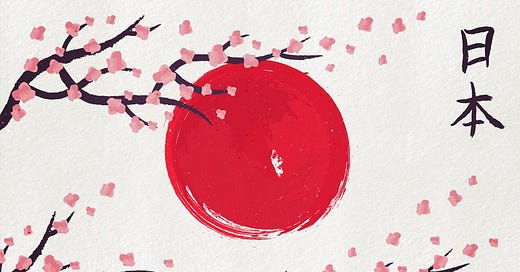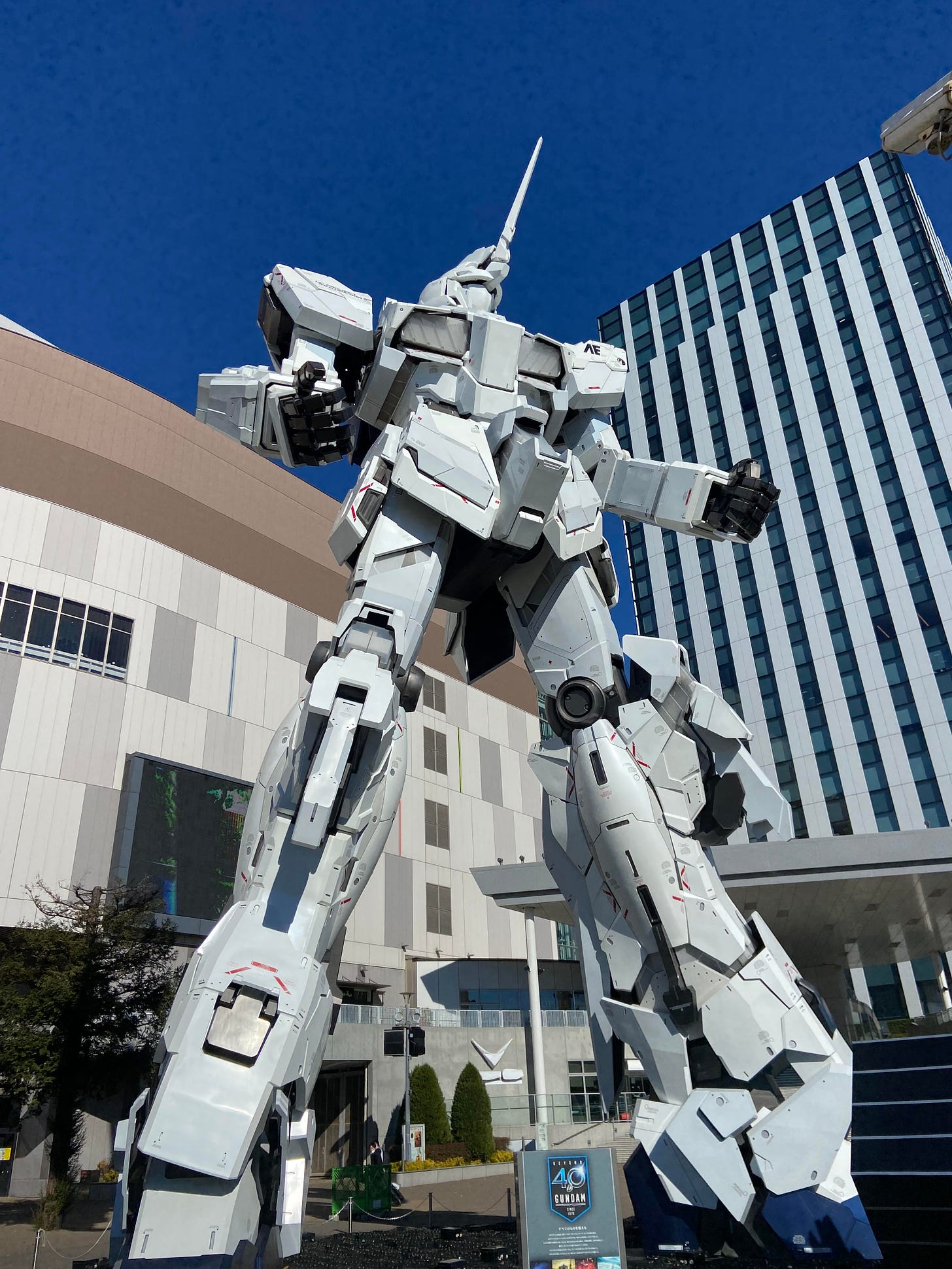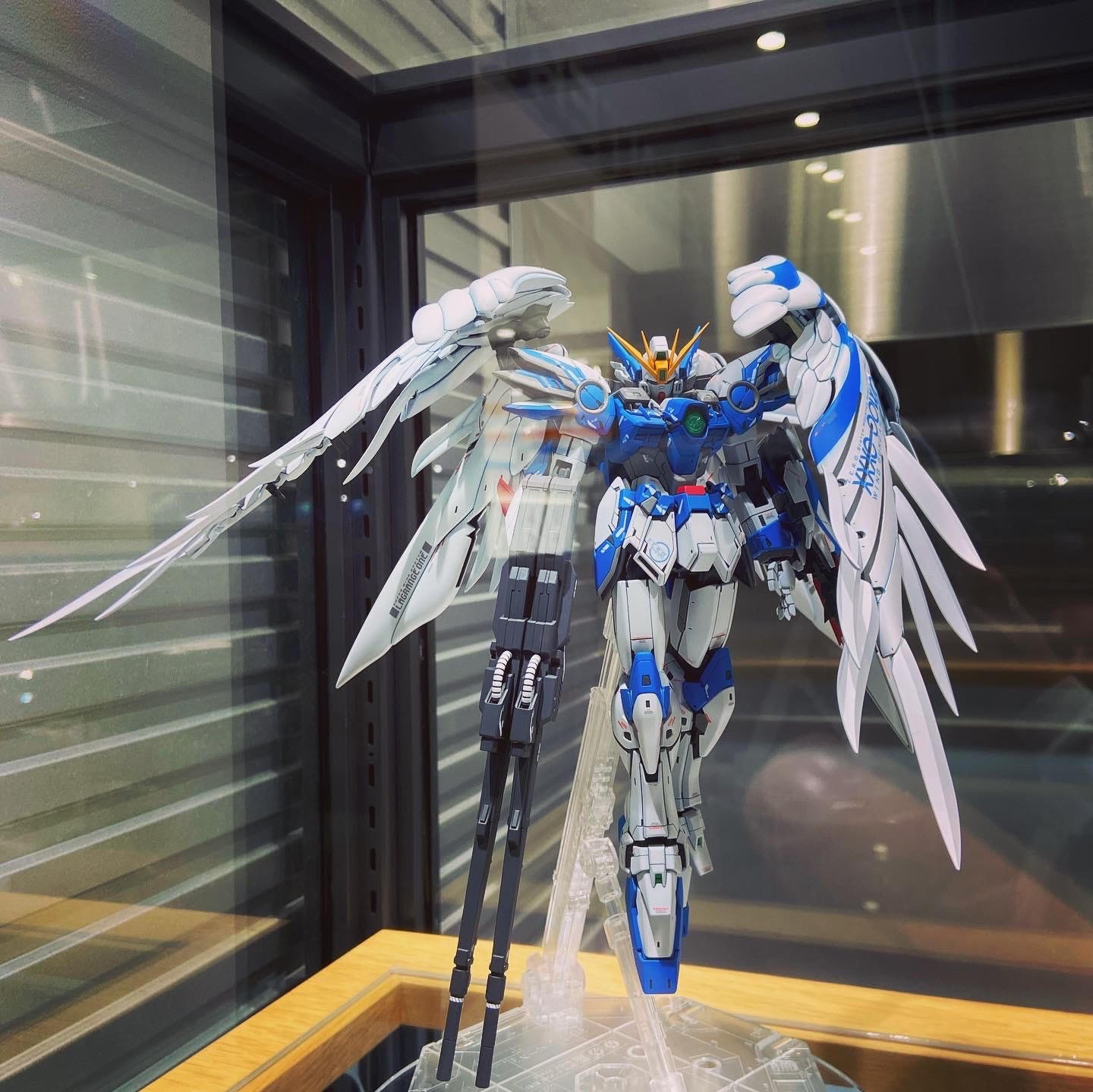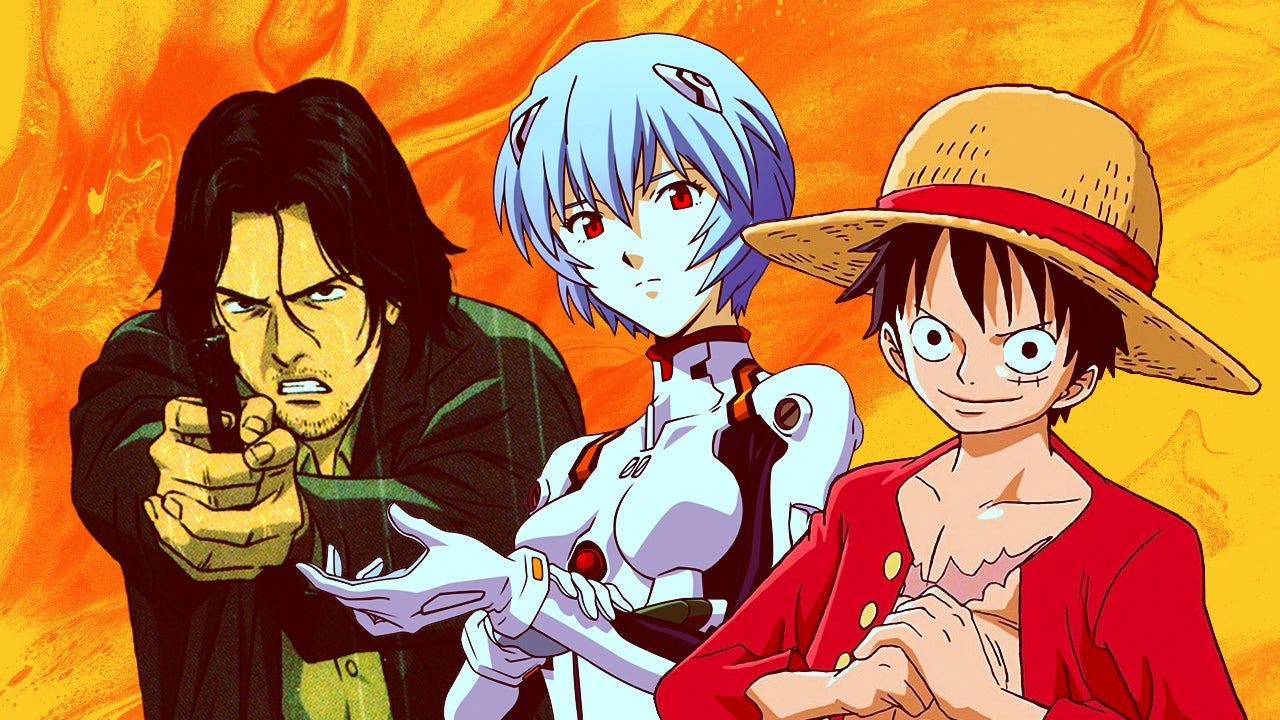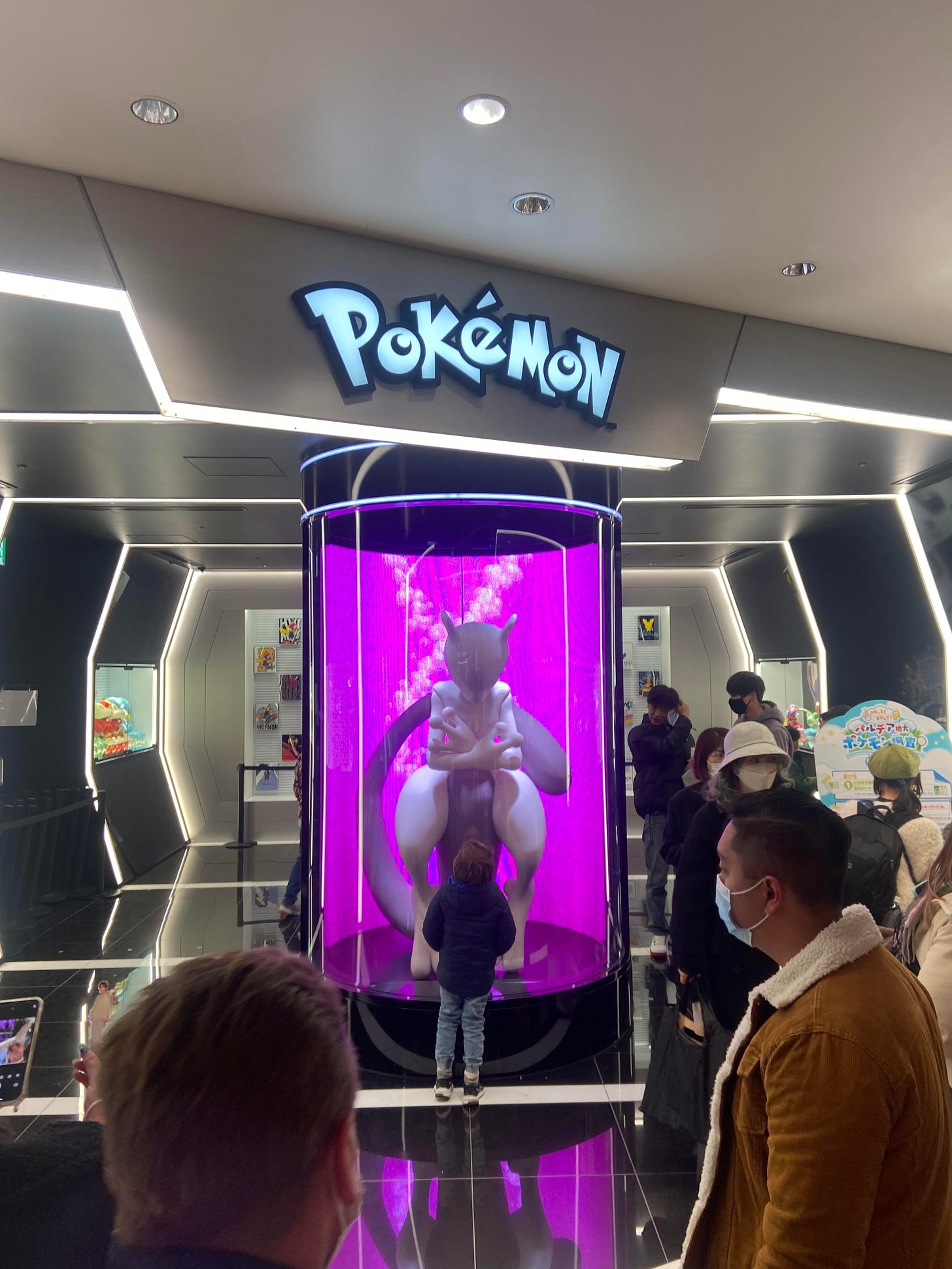Why Everyone Should Go To Japan
The immersive experience we all want and need (with recs at the end!)
I just spent 2 weeks in Japan. Akin to a psychedelic trip, it felt like a dream; rocking my world and creating an internal shift that blew my doors of perception wide open.
An Aldous Huxley quote comes to mind (from his book Doors of Perception):
“The man who comes back through the Door in the Wall will never be quite the same as the man who went out. He will be wiser but less sure, happier but less self-satisfied, humbler in acknowledging his ignorance yet better equipped to understand the relationship of words to things, of systematic reasoning to the unfathomable mystery which it tries, forever vainly, to comprehend”
Indeed, I'm emerging from this 'trip' not quite the same.
I feel wiser and awakened. Wiser to how a life can and should be lived. Awakened to what true balance and harmony looks like, even amidst the world's inevitable chaos (aka: 'Medium Energy').
To the downstream benefits of a deliberate and methodical approach to all things: our craft, our interactions, our days, the full arc of our lives.
To the comfort that comes from a societal foundation of respect and politeness.
To the beauty of a world that properly harnesses the promise of technology, while still honoring and remaining connected to the past, to nature, and to each other.
And yet… While my cup now runneth over with satisfaction, a pang of craving remains. A craving to see more of the world in this way; for more adventure, for more diverse relationships, for a broader understanding of the world in which we live; its history, its array of cultures, its people.
As for the relationship of ‘words to things’... Most Western minds go to the same place at the thought of Japan.
We conjure words like samurai and geisha, sushi and ramen, bullets trains and 'salary men' in black suits, Mt. Fuji and cherry blossoms; all popularized via movies, books, and video games.
But after experiencing them first hand? No doubt, Western media fails to capture the complete essence of the thing itself, and the wider essence of Japan.
The first-hand experience is entirely different.
It's like being dropped into a real-world virtual reality. Or dare I say... a metaverse. One that tears your mind in opposite directions; blasting you into a modern, Utopian future, while simultaneously stretching you towards a traditional and historic past.
It was my first time feeling in an entirely foreign land, unable to communicate, unable to navigate, unable to comprehend how such a place could possibly exist.
This difference between 'experiencing' Japan (in a first person, immersive '3D' way) and 'consuming' Japan (in a more removed, abstracted, 2D way)… It hardens my enthusiasm for spatial computing and our team's current mission at AWS: to shift the 2D internet towards an immersive, 'experiential' 3D internet.
Why does this mission matter?
Because not everyone has the ability to go to places like Japan and experience them in all their glory; in a fully 'spatial' way, with all their senses engaged and their proprioception activated (the feeling/awareness of our body in space; hardening our understanding, our memory, our agency in the world; all requirements to truly grasp Japan's beauty, its wonders, paradoxes, and nuance)
But if they could... and if they did... I do think the world would be a better place.
You can't go to Japan and not have your world view shifted, and your approach to life, re-examined. The big things and the small.
I'm already taking my shoes off at the door and tidying up my desk. I can also feel my time horizon for 'success' expanding. The haste to 'make it’ now, dissipating.
Of course, we're a ways out from having virtual/augmented reality that is good enough to substitute for the real thing. But, not that far out...
Heck, Apple's imminent mixed reality device might blow the industry's socks off here in 2023, accelerating the adoption curve dramatically (fingers crossed, see this article to get your hopes up. Eye tracking, 8k display, pass through mixed reality, custom silicon, oh my).
Regardless of Apple's timing, within most of our lifetimes... we will be able to go to Japan with just the click of a button (or a flick of the wrist?).
But until then... here's a series of anecdotes to help explain why EVERYONE needs to go to Japan.
At least once.
Takamie and Ikigai
Lost in deep concentration, the sushi chef grabs, flips, and slaps a glistening hunk of fatty tuna on the table.
The dense marbling pops against a backdrop of bright bubble gum pink. With robotic precision, his blade slices, and slices, and slices, and slices; thick, finger length pieces stacking methodically on top of each other, mounting higher, and higher, and higher.
The chutoro (fatty tuna) now compiled, he grabs a hunk of rice. His hands are a blur of movement, shaping and massaging with the perfect balance of gentle and firm.
This isn't ordinary rice. It’s his newest recipe. Perfected over three months of iteration. Tweaked and tuned across dozens of variables and hundreds of combinations: heat, vinegar, sodium, time, water type, etc.
The result? Rice in a category all on its own. To even call it rice is up for debate (at least as us Westerners know it).
At last, the marriage of the fish and the rice. The merging is a sight to behold.
The chutoro intimately blankets the rice, giving it purpose. The rice gives the chutoro a new curvature. A new form and identity atop a solid foundation.
But not too solid. There's space for both to breathe.
When the finished piece of sushi hits your plate, this space allows for a nearly imperceptible moment of compression.
Like a sigh of relief, the rice compresses under the weight of the fish, and by a mere fraction, the fish slowly sinks in space.
This sinking moment. This is the sign of the perfect piece of sushi.
Blink and you'll miss it. That subtle ‘sigh’ is all the evidence you need. Evidence of tens of thousands of hours of mastery and pure perfection, compressed into a fraction of a second.
As for the moment this piece of sushi hits your mouth? I'll leave that to the imagination.
That moment isn't the point. The point is everything that led up to it.
--
Japanese culture deeply values the pursuit of perfection.
Not achieving perfection. Rather, the journey towards it, by simply being/doing your best with a care for the craft, an immaculate attention to detail, and a constant thrust towards improvement.
This differs from being ‘the best’ in a Western sense, which is usually associated with winning. Or with power, money, and fame; some sort of end result, displayed on some sort of scoreboard.
In Japan, being/doing the 'best' is more a virtue. An approach to human flourishing, and a way to save us from what is most often our worst enemy-- ourselves. Our laziness, our ego, our greed.
In Japan, the approach trumps the outcome. The outcome in an emergent property of the right inputs, done right.
We’ve all heard this preached via self- help books, parents, coaches, bosses. But how often does it stick?
In Japan, it's embedded into their ethos. And it shows up everywhere.
Whether it's a Michelin grade sushi restaurant or an airport noodle shop... every bite of food in Japan ranges from extremely good to exquisite. Every train, precisely on time. Every street corner, sparkling beyond belief. Every interaction with staff, lovely and memorable.
How is it that the quality bar is so high? Across all things? Especially in a colossal metropolis, as sprawling and densely packed as Tokyo?
I think the answer is a thoughtful codification of principles.
Not hollow platitudes, but well-defined principles to which everyone genuinely commits. Principles they actually live and breathe, and to which they hold each other accountable. Principles rooted in respect for craft, and respect for others.
This is the key to any strong culture, be it a nation, a corporation, or a family unit.
The idea of principles might be an eye roller for some. But I can say from my experience with the Amazon Leadership Principles… When there is buy in, they work.
There are many reasons Amazon is one of the most successful companies of all time. But many people, outsides and insiders alike, will vouch for these Leadership Principles as the key ingredient.
Similar to Amazon Principles like ‘Bias for Action’ or ‘Dive Deep’, or the Navy Seal’s “slow is smooth, and smooth is fast”, Japan has succinctly phrased principles of their own.
The following was on the menu at my first Japanese ramen restaurant:
"Takamie: Takamie is what drives us and keeps us improving. It's the idea of pushing ourselves to reach higher, constantly looking inward to see how we can be better than the day before; for our communities and for our customers. We look to takamie as we listen, learn, and grow. Little by little, bowl by bowl."
This incremental improvement also acts as a source of purpose in itself. Which parlays us into one of Japan’s most defining principles: Ikigai.
Ikigai loosely translates to 'reason for being' or 'finding a purpose to live'.
'Iki' means life. 'Gai' means value or worth. And in finding purpose in the process, and in the mere pursuit of perfection, purpose can reside within any task, from running a Fortune 1000 company, to sweeping leaves in a garden.
In living these principles, Japanese people seem unusually satisfied and content, regardless of their lot in life.
Call the correlation a coincidence... but they also have a longer life expectancy than people in the US (80-85+). This is especially true in the ‘blue zones’, where residents attribute their longevity (100+ years) to principles like Ikigai and Takamie.
So, in our pursuit of longer, happier, more fulfilling lives...perhaps we should ask ourselves: what principles define us? Where should we be applying more principles-based thinking and behavior?
(For an amazing deep dive into culture, and the power of codifying principles, check out Daniel Coyles book, ‘Culture Code’. One of the best books I’ve read this decade.)
Omenashi: Kindness and hospitality
Upon entering the 7-11, I was hit by a wave of bubbly and enthusiastic Japanese words and shouts.
The man at the cash register was vigorously waving with both hands. The man sweeping the floors stopped and bowed. The man preparing food laid out his hands to present his array of options: tempura, sushi rolls, chicken karagi, pork buns, dumplings, and plenty of sake or beer options to boot. It was an immaculate Japanese feast.
I looked around to make sure I wasn't lost or missing something. But no, I was indeed in a 7-11, and they were indeed giving a random American tourist the red-carpet treatment. You would have thought I was the Prime Minister of Japan.
Energized by their enthusiasm, I found myself giddy to be there and eager to give them all my yen.
A little different than my typical Los Angeles 7-11 experience...
Not too long after, I caught a cab across town. I paid with cash, pocketed the change, and proceeded on my marry way.
I was at least 2-3 blocks down the street when I heard shouting and feet slapping the pavement. I turned to see my cab driver jogging towards me. Upon arrival, he handed me a few coins that I must have dropped. About 30-50 Yen (a mere .25 - .40 cents USD...).
I thanked him profusely, only to have him thank me in return. Bowing numerous times before trotting back to his cab.
Encounters like this happened time and time again.
My pockets were spitting up coins with every move I made, sending sweet Japanese men and women darting in pursuit, this way and that; servers diving under tables at cafes, conductors sprawling under seats on the trains, security people reaching under scanners at airports. My change management was appalling, but without fail, they would hunt me down and return the meager cents, with a beaming smile and a gracious bow.
And if you want to show your gratitude with payment or tip? Good luck. They won't take it.
I tried tipping my masseuse a standard 20% percent, and when she saw the receipt, the poor woman almost had a heart attack. No no no no no, she shouted, demanding that I scratch it off the bill.
Be it spare change, food, transport, or massage, Japanese people really do love (if not live) to host, help, and serve.
--
The Japanese word for hospitality is Omotenashi. It acts as yet another principle/string of code in their cultural DNA, capturing the way in which the Japanese serve, pay attention to detail, and anticipate their guests' needs.
'Omote' means public face, or the image you wish to present to outsiders. 'Nashi' means ‘nothing’. The combination of the two means something that loosely translates to, ‘every service is from the bottom of the heart’-- with honesty, without hiding, and without pretending.
This principle is not one way. It concerns the guest/recipient as well. The spirit of Omotenashi is grounded in mutual respect. While people consider it a privilege to serve, they expect guests to pay respect in return.
Now, this doesn't come naturally to every person who serves in Japan. It takes training and mentorship.
One of the phrases they use in training staff or mentees is the phrase 'ichigo ichie', which translates to 'one time, one encounter', acting as a reminder that they should treat every encounter as a once in a life time event.
Just imagine what your day to day might be like if with every encounter, you experienced this level of kindness and respect. Now imagine it on a societal scale.
Or, you don’t have to imagine. You could just go to Japan.
Speaking of imagination…
Imagination and Play
There it was, the life-sized object of my childhood obsession.
Towering 64 feet overhead, a full-scale Gundam mech stood armed and ready, casting a vast shadow over swarming groups of fanboys/girls, clamoring for the perfect selfie.
And not just any Gundamn Mech. This was the mo-fo' Unicorn Gundam: one of the most powerful in the known universe.
What was that? What's a mech? Psh, come on... It's a human piloted robot. Aka: a 'mech suit'.
No, NOT to be confused with a Tansformer. Blasphemy...
Gundam is 100x more bad ass than Transformers. Far more inspiring as well. Gundam represents the ultimate merging of man and machine. The ultimate symbol of how technology can perfectly complement and extend our humanity, without eroding it and limiting us to AI pawns.
Okay I know what you're thinking.... the name 'Unicorn' for a military-grade robot of the future isn't exactly the most intimidating/imposing. Especially compared to its kin: Death Scythe, Atlas Gundam, or Wing Gundam Zero.
But that's part of anime's charm. It's quirky, but serious. It can be playful, but violent. It can be childish, but also full on X-rated, disturbing, and absurd. More often than not, it's thought provoking and endlessly imaginative, capturing the pros and cons of the human experience in beautiful and non-obvious ways.
If you’re entirely unfamiliar, anime is the Japanese approach to animated media: cartoons, comics, video games, or film, but with their own unique style, sharing commonalities in the portrayal of people, action, landscapes, backdrops, etc.
But this is no Finding Nemo or Frozen…
Anime doesn't pull any punches, abstract away any truths, or cater to woke'ism. While most anime is joyful and light (a la Dragon Ball Z, Pokemon, Sailor Moon), it can also expose the deepest, darkest, and oft more interesting depths of the human plight: depression, death, suffering, sexuality.
The best anime is able to weave together both the light and the dark sides of the human experience. The Japanese understand the power of paradox: to know joy we must know sorrow, to know true love we must know heart break, to appreciate life we must embrace death. Poignant truths we all too easily forget.
The end result is mostly pure fun, capturing the heart and minds of numerous generations with rich and wildly imaginative characters, worlds, and narrative.
Both children and adults alike love them some anime. For some, anime is life.
The oft found paradoxes within anime are a direct reflection of the paradoxes in Japanese culture, and life itself, for that matter.
And that's part of it's allure. For is life not just a collage of constant paradox?
--
"There is an ecstasy that marks the summit of life, and beyond which life cannot rise. And such is the paradox of living, this ecstasy comes when one is most alive, and it comes as a complete forgetfulness that one is alive." - Jack London
--
Japan's adoration for anime is a paradox in itself. On one hand, the Japanese people are all business. They’re deadly serious in embracing their Ikigai and Takamie to the fullest.
But like any culture spiritually rooted in Buddhism... they know how to balance things out. They love to be entertained, they love to play, and they really love to kick back and relax. And boy are they good at it.
One trip to a Japanese Onsen (public hot springs/bath houses) for some aprés ski, and you'll see what I mean.
In tandem with anime sits Japan's obsession with video games. Sure, video games are big everywhere. But there's something different about Japan's embrace of the medium.
Some of the most popular games are based on anime, allowing players to partake in their most beloved universe/IP. But I think the main defining characteristic is how Japan treats games with a different level of appreciation and respect.
In the West, video games often get a bad rep. A waste of time, anti-social, too violent, etc.
Japan recognizes and embraces all the positive things games have to offer. How games help kids learn new skills and problem solve, boosting their creativity along the way. Or how online games and e-sports cafes help them build community and make friends, learning how to collaborate and become leaders during their missions.
These aren't just opinions... real research is going into the benefits of video games for developing cognitive, social, and emotional development. The data is in, and it's wildly positive.
If you want a great read on this topic, check out 'Reality is Broken: Why Games Make Us Better an How They Can Change The World', by Jane McGonigal.
Or just watch her TED Talk here. It's worth the time.
As productivity/'hustle' culture tightens its grip on modern society, play will be a critical counterbalance.
With increased (and constant) exposure to success and fame, comes an increased pressure to do more, be more, succeed more. Taking time off, unplugging, self-care, heck even wasting time for the sake of wasting time. These things are all too often frowned upon, but their benefits, immeasurable.
Japan knows this. Like anime and games, we should all take life less seriously and have more fun. Like anime and games, we should use our imaginations and science fiction to inspire a better future.
The entertainment/play we choose doesn’t have to be frivolous. It can be rooted in narrative that educates us and reminds us what good looks like; content that properly resets our perspective and reminds us of the power of paradox.
—
"Life is strong and fragile. It's a paradox... It's both things, like quantum physics: It's a particle and a wave at the same time. It all exists all together." Joan Jett
—-
The pursuit of perfection, the joys of hospitality and respect, the power of imagination and play… these things just scratch the surface of all that Japan has to offer…
I urge you-- tap into your adventurous side. Don’t wait. Go experience Japan for yourself, and do it soon.
And as you work to find time amidst all your obligations or your sloth, take this closing Huxley quote to heart:
“Most lead lives at worst so painful, at best so monotonous, poor and limited that the urge to escape, the longing to transcend themselves if only for a few moments, is and has always been one of the principle appetites of the soul.”- Aldous Huxley
Don’t wait. Find the time. Feed your soul.
Over and out.
If you enjoyed, please share with friends and subscribe via the two links below. More to come.
Also, for recs on my favorite spots in Japan (restaurants, sights, etc), see the list at the bottom!
Recommendation List
Tokyo Food
Sushi
Sushi at the Tokyo Fish Market - Sushi Dai and Daiwa sushi are the two most famoust. But you’ll need to get there by aroudn 6/7am (at least) and likely wait in line for 30-60 mins. I just went a bit later and got into Iso Sushi nextdoor (building across the way, 3rd floor). It was also amazing… See this blog for more info
UMI Sushi (mindblowing)
Udatsu (even more mind blowing)
Ebisu Endou
Seamon Ginza
Nishiazabu Sushi Shin
Sushi Saito
Sushisho Masa
Tokyo Izakaya (Japanese bars/restaurants with a fun atmosphere and awesome food)
Jyuban Ukyo
Kotaro
Just cruise around Azabu Juban and use you instints. Awesomes spots abound.
Tokyo Noodles (Ramen, Udon, Soba)
Menya Musashi- unreal ramen
Ryan- prob the best Udon/Soba in Tokyo
Inaniwa Udon Sato Yosuke
Hon Mura An- Soba in Ropponghi
Other Tokyo Restaurants
For Teppanyaki (habachi grill style)…
Sekishin Tei- awesome setting by a beautiful garden
Akasaka- One of the best kept secrets in super cool old japanese hotel called Hotel Okura,
For Okonimiyaki… (massive grilled pancake which can contain everything from octopus, shrimp, a variety of meats such as pork belly, vegetables and is served over noodles with an egg and bonito flakes on top. It’s a crazy creation and very deliciou)
Sakura-tei - in a really cool setting within the art district in Jingumae
Chibo
There are so many… Google is your friend
Tokyo Activities & Museums
TeamLabs - immersive art exhibit
Gundam HQ/Basement - if you’re into that kinda thing
Drum TAO - a must see taiko performance (think Cirque de Solei meets Blue Man Group with traditional Japanese spin)
Mori Art Museum
National Museum of Modern Art
Surugaya Co- Akihabara Game Museum
Tokyo Bars/Drinks
Gen Yamamoto- intimate setting with a master mixologist making unique drinks. Need a resy at least 2 weeks in advance.
High Five
Whiskey Library
Star Bar Ginza
The Peak Lounge
New York Bar - the bar from ‘Lost in Translation’
Restaurants & Stuff To Do By Tokyo Neighborhood
Harajuku
Urahara - where gwen stefani was reborn.
Cat Street - young, fashion alley
Meiji Jingu Shrine - get your spiritual walk on with a stroll thru the shrine grounds, enter here.
Yoyogi Park - Huge park connected to the huge shrine.
DESIGN FEST GALLERY! It’s an awesome local art space. Right nearby is Mojo Coffee - the best/strongest that I found in Tokyo.
Shibuya
Streamer Coffee Co. - another coffee spot by the office
TRUNK (Hotel) - new-ish hipster hotel with spacious, bougie lobby bar scene
Crunchyroll KK - home base.
Whoopi Goldburger - funky burger spot near the office.
Izakaya Maruko - sister to Manmajima
Uoshin - Amazing seafood. Foreign friendly.
Shibuya crossing - Lost in Translation requisite for white people.
Kotaro - apparently, very good Izakaya.
Caroline’s notes: Right around the corner from the TRUNK Hotel, there is a tiny sake bar upstairs in a building on the corner. They have a great selection, are super nice, and have good snacks. Find it on my map!
Omotesando- lots of high end shopping if that’s your thang
Beverly Hills-like area with boutiques, etc.
CICADA - bougie western-style Mediterranean restaurant, also doubles as a bakery/cafe during the day
THE LOCAL COFFEE STAND - THE coffee spot me & Pak go to. The girl who works there is a future ex-wife of mine
KOFFEE MAMEYA - serious coffee.
Bread & Espresso - never been, but it’s on the list.
Shinjuku
Best tempura: Tenko - in an old geisha house which is fun but a bitch to find. get picture or sign from concierge, set menu only --go for the bigger one!
Park Hyatt - New York Bar from Lost in Translation
Tokyu Hands - this is a crafts emporium with multiple locations, but definitely worth a visit (for souvenirs too)
Buy foodstuff in the basement of the Shinjuku department store ISETAN and bring them up for a picnic on the building’s rooftop (a hidden gem)
Ginza/Yurakucho/Tokyo Station - Old money & fancy, but cool and worth it
Tempura Ten ichi - lots of history, a bit touristy, pricey but soooo tasty
Tempura Kondo
Ginza Ukai-Tei - larger establishment, fresh seafood, there is another location in the Omatesando mall, they are famous for their abalone
Birdland for yakitori
Ippudo for ramen (chain, also in Harajuku). best gyoza !!
Kagari - by Ginza station. worth the wait
Sushi DokoHarada (Kaiseki sushi) Call ahead for a spot.
Kyoto Stuff
Must Try
Gion Tanto- unreal Okonimiyaki and Teppanyanki
Smart Coffe- best french toast I’ev ever had
RUTUBO - super fun and tasty izakaya
Bar Rocking Chair- amazing drinks and super cool vibe
Bee’s Knees- ranked one of the top bars in Japan. Small, with top notch mixologists.
Must Do
Rent bikes and just cruise- this spot is great, The Good Day Velo Bikes & Coffee
Walk the Philosophers Path
Hike/run up Daimonjiyama Mountain (about 45/60 mins hike, not bad)
Arashiyama Bamboo Forest
Nishiki market- Bop around
Fushimi Inari - the Thousands Torii Gate, famous red gates up the mountain
Kinkakuji - Golden Temple + gardens
Ryoan-Ji Temple - as the meditiative rock garden
Kiyomizuu-dera- sick temple with fun shopping along the path on the way
Izakaya
Rutubo
Musashi Sushi (fun and good conveyor belt)
Ramen
Kyoto Gion Ramen
Sugari
Men-ya Yukou
Ramen Miyako
Musoshin
Udon
Ogura Chaya
Kyoto Gion Okaru
Gontaro
Soba
Misoka-an-
Dangoro
Sushi
Sushiiwa
Sushi-Kappo Nakaichi
Steak/Wagyu
Premium Wagyu Steak Hanasato Gion
Kobe Beef Steak Mouriya Gion
Fresh Market
Cafe’s + Coffee & Breakfast
Smart Coffee- best French Toast I’ve ever had
Kawa Cafe

